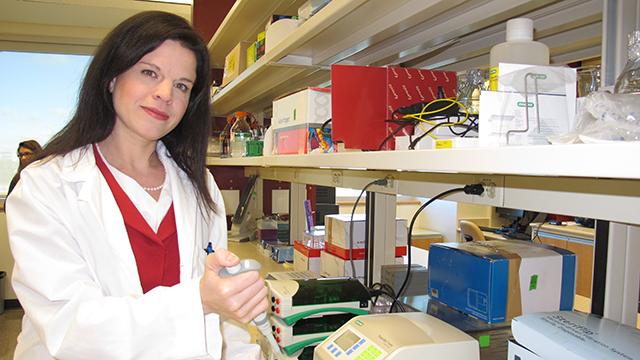Newly found biomarkers 99% accurate at differentiating between two types of ovarian cancer, according to University of Alberta researcher

Credit: University of Alberta
Oncologists may soon have an accurate and inexpensive way of differentiating between types of ovarian cancer that will improve how patients are treated, thanks to findings from a national research study co-led out of the University of Alberta.
“One of the issues with ovarian cancer is that we cannot fully decipher between subtypes,” said Lynne Postovit, U of A oncology researcher and co-director of the Cancer Research Institute of Northern Alberta. “This is an important problem because the different subtypes should be treated differently.”
She explained that women with endometrioid-type ovarian carcinoma usually have a better prognosis for beating the disease and need a less aggressive treatment than women suffering from high-grade serous carcinomas, which is the most common and deadly form of ovarian cancer.
Unfortunately, the diagnosis of which form of ovarian cancer a woman has is wrong 10 per cent of the time.
“That doesn’t sound like a big deal, but the difference in the ways that women with endometrioid versus high-grade serous are treated is significant,” said Postovit, who received funding from the Lois Hole Hospital for Women through the Women and Children’s Health Research Institute.
“Not knowing with complete certainty which form of cancer the patient has means that oncologists have to go with the harshest treatment regardless.”
Growing weary of the cautionary and often overly aggressive one-size-fits-all treatment, Postovit, together with colleagues at the University of Calgary and Western University, looked at the proteins present in the different types of cancers.
The team found eight protein biomarkers that enable pathologists to differentiate between a endometrioid or high-grade serous carcinoma with 99.2 per cent accuracy.
“The relevance is if you know what you’re looking at, you take a precision medicine approach to better tailor the treatment to the patient, so they have potentially less side-effects,” she said. “This is what personalized medicine is all about–starting to look at each patient’s cancer differently.”
And because the study was tailored to be more practical, Postovit said the team can immediately start to test how broadly this might work.
“In fact, because it is a rather inexpensive test and involves technology we already have, there is no need to build a new paradigm. It can be taken up without costing all that much.”
Postovit said the next steps are to validate the results on a larger patient cohort and then to suggest implementation, which could be within a few years.
“This is all because of philanthropic and chair funding that allows us to ask questions that normally we wouldn’t,” she said.
###
Media Contact
Ross Neitz
[email protected]
Original Source
https:/
Related Journal Article
http://dx.




